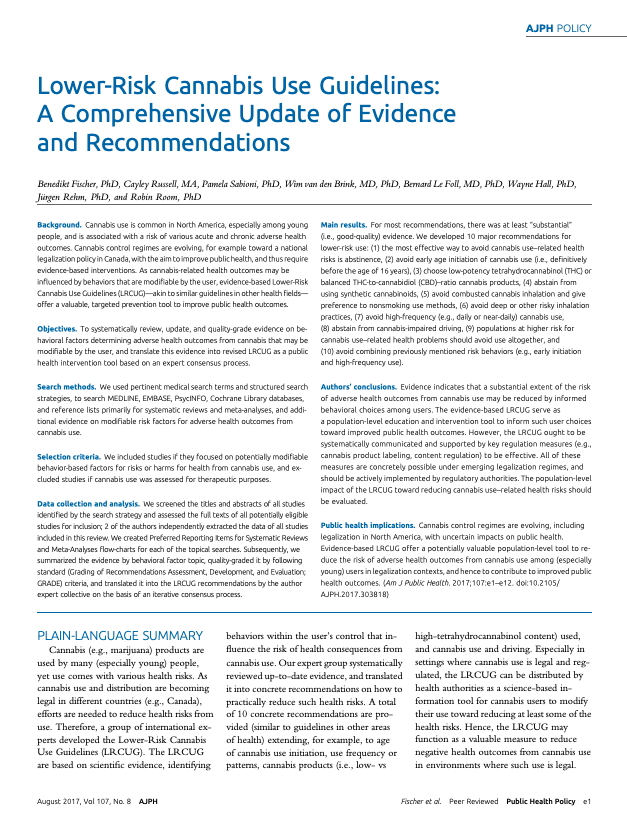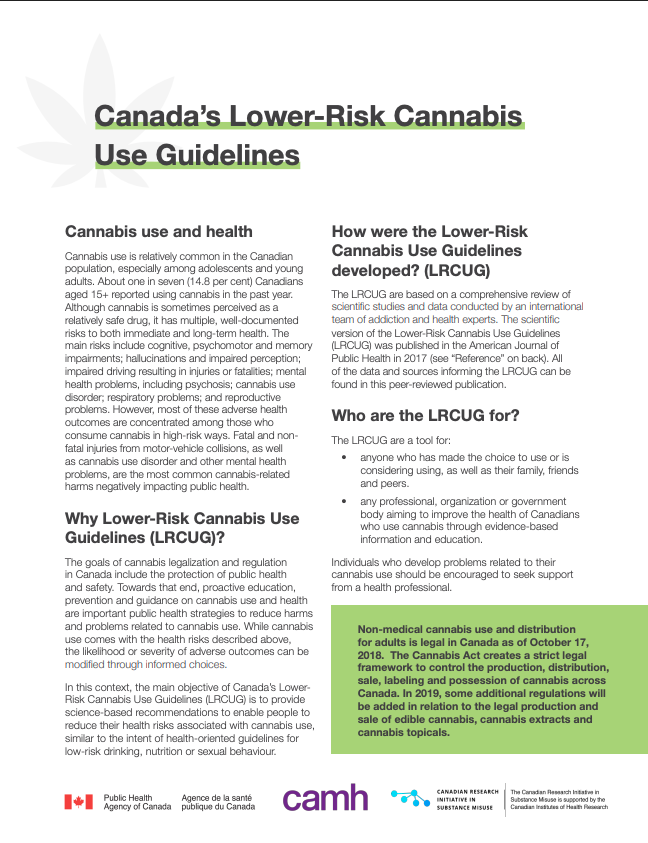Lower Risk Cannabis Use Guideline
August 2017
- Anyone who has made the choice to use or is considering using, as well as their family, friends and peers.
- Any professional, organization or government body aiming to improve the health of Canadians who use cannabis through evidence-based information and education.

The Lower Risk Cannabis Use Guidelines (LRCUG) are an evidence-based public health intervention tool. As cannabis was legalized in Canada in October 2018, an update of the LRCUG was a timely and essential undertaking, as the guidelines offer a potentially valuable population-level tool to reduce the risk for adverse health outcomes from cannabis use among (especially young) users. The LRCUG include 10 core harm-reduction-based recommendations.
The present work was led by Dr. Benedikt Fischer of the Ontario CRISM Node and a team of renowned addiction and health science experts. The 2017 guideline is the result of a comprehensive scientific update and revisions to the original guideline (from 2011) and was published in the American Journal of Public Health.
RECOMMENDATION 1: The most effective way to avoid any risks of cannabis use is to abstain from use.Those who decide to use need to recognize that they incur risks of a variety of—acute and long-term—adverse health and social outcomes. These risks will vary in their likelihood and severity with user characteristics, use patterns, and product qualities, and so may not be the same from user to user or use episode to another. [Evidence Grade: None required.]
RECOMMENDATION 2: Early initiation of cannabis use (i.e., most clearly that which begins before age 16 years) is associated with multiple subsequent adverse health and social effects in young adult life. These effects are particularly pronounced in early-onset users who also engage in intensive and frequent use. This may be in part because frequent cannabis use affects the developing brain. Prevention messages should emphasize that, the later cannabis use is initiated, the lower the risks will be for adverse effects on the user’s general health and welfare throughout later life. [Evidence Grade: Substantial.]
RECOMMENDATION 3: High THC-content products are generally associated with higher risks of various (acute and chronic) mental and behavioral problem outcomes. Users should know the nature and composition of the cannabis products that they use, and ideally use cannabis products with low THC content. Given the evidence of CBD’s attenuating effects on some THC-related outcomes, it is advisable to use cannabis containing high CBD: THC ratios. [Evidence Grade: Substantial.]
RECOMMENDATION 4: Recent reviews on synthetic cannabinoids indicate markedly more acute and severe adverse health effects from the use of these products (including instances of death). The use of these products should be avoided. [Evidence Grade: Limited.]
RECOMMENDATION 5: Regular inhalation of combusted cannabis adversely affects respiratory health outcomes. While alternative delivery methods come with their own risks, it is generally preferable to avoid routes of administration that involve smoking combusted cannabis material (e.g., by using vaporizers or edibles). Use of edibles eliminates respiratory risks, but the delayed onset of psychoactive effect may result in the use of larger than intended doses and subsequently increased (mainly acute, e.g., from impairment) adverse effects. [Evidence Grade: Substantial.]
RECOMMENDATION 6: Users should avoid practices such as “deep inhalation,” breath-holding, or the Valsalva maneuver to increase psychoactive ingredient absorption when smoking cannabis, as these practices disproportionately increase the intake of toxic material into the pulmonary system. [Evidence Grade: Limited.]
RECOMMENDATION 7: Frequent or intensive (e.g., daily or near-daily) cannabis use is strongly associated with higher risks of experiencing adverse health and social outcomes related to cannabis use. Users should be aware and vigilant to keep their own cannabis use—and that of friends, peers, or fellow users—occasional (e.g., use only on 1 day/week, weekend use only, etc.) at most. [Evidence Grade: Substantial.]
RECOMMENDATION 8: Driving while impaired from cannabis is associated with an increased risk of involvement in motor-vehicle accidents. It is recommended that users categorically refrain from driving (or operating other machinery or mobility devices) for at least 6 hours after using cannabis. This wait time may need to be longer, depending on the user and the properties of the specific cannabis product used. Besides these behavioral recommendations, users are bound by locally applicable legal limits concerning cannabis impairment and driving. The use of both cannabis and alcohol results in multiply increased impairment and risks for driving, and categorically should be avoided. [Evidence Grade: Substantial.]
RECOMMENDATION 9: There are some populations at probable higher risk for cannabis-related adverse effects who should refrain from using cannabis. These include individuals with predisposition for, or a first-degree family history of, psychosis and substance use disorders, as well as pregnant women (primarily to avoid adverse effects on the fetus or newborn). These recommendations, in part, are based on precautionary principles. [Evidence Grade: Substantial.]
RECOMMENDATION 10: While data are sparse, it is likely that the combination of some of the risk behaviors listed above will magnify the risk of adverse outcomes from cannabis use. For example, early-onset use involving frequent use of high-potency cannabis is likely to disproportionately increase the risks of experiencing acute or chronic problems. Preventing these combined high-risk patterns of use should be avoided by the user and a policy focus. [Evidence Grade: Limited.]
Knowledge Transfer
The following knowledge translation materials for the LRCUG have been updated and are currently available for public use:
- A revised ‘Public Brochure’ version (mainly for cannabis users; available in both English and French)
- A ‘By Youth for Youth’ version (mainly for young people; available in both English and French). A Youth Resource Link was also developed.
- LRCUG Poster (mainly for public health professionals; available in both English and French)
- LRCUG Postcard (mainly for public health professionals; bilingual doc-ument)
- A ‘Summary Brief’ version of the LRCUG (mainly for health professionals)
- Infographic of the LRCUG Recommendations (mainly for media/online purposes; available in both English and French).
- The products are available by order from the CAMH Store [Email: Publications@camh.ca]
Endorsements
The LRCUG have received authoritative national endorsements from seven leading national medical public health and substance use organizations:
Canadian Medical Association (CMA), Canadian Public Health Association (CPHA), Council of Chief Medical Officers of Health (CCMOH), Canadian Society of Addiction Medicine (CSAM), Canadian Centre on Substance Use and Addiction (CCSA), Canadian Mental Health Association (CMHA), Mental Health Commission of Canada (MHCC), Canadian Nurses Association (CNA) and Centre for Addiction and Mental Health (CAMH).
The LRCUG have, furthermore, been welcomed and supported by the federal Minister of Health and endorsed by the Ontario government in its official cannabis legalization strategy (see under Prevention & Harm Reduction).
LRCUG for Public Health Professionals:
In March, 2018, the Public Health Agency of Canada (PHAC) reached out to OCRINT to collaborate in order to translate the LRCUG into a suite of knowledge mobilzation tools specifically tailored to public health professionals. After consultations with a steering committee formed of members from key public health groups (e.g. Pan Canadian Public Health Network, Council of Chief Medical Officers of Health, Rural and Remote Public Health Network, Urban Public Health Network, the Canadian Public Health Association and the Canadian Nurses Association), the OCRINT team developed five distinct knowledge translation products, and hosted a webinar in March, 2019, aiming to help public health professionals better understand the guidelines and be able to confidently share this knowledge with their networks and clients.
PHAC/LRCUG Knowledge Translation Products:
- Poster for Public Health Professionals (English) (French)
- Post Card for Public Health Professionals (Bilingual)
- Evidence Brief for Public Health Professionals (English) (French)
- Frequently Asked Questions (FAQ) for Public Health Professionals (English) (French)
- PowerPoint Presentation Slide Deck for Public Health Professionals (English) (French)
- Webinar recording for Public Health Professionals (English)


